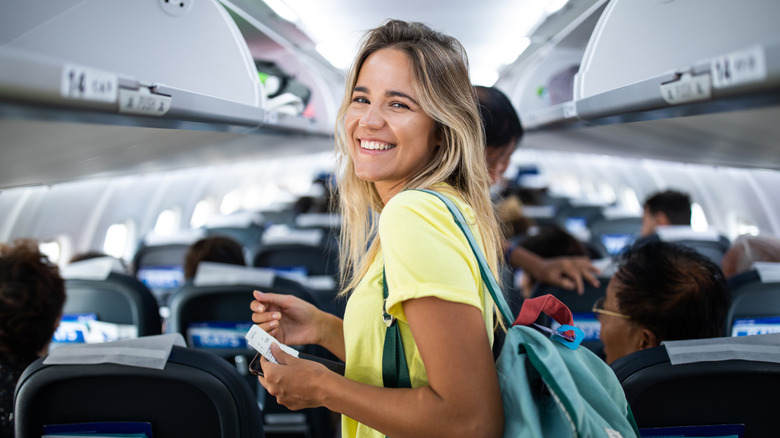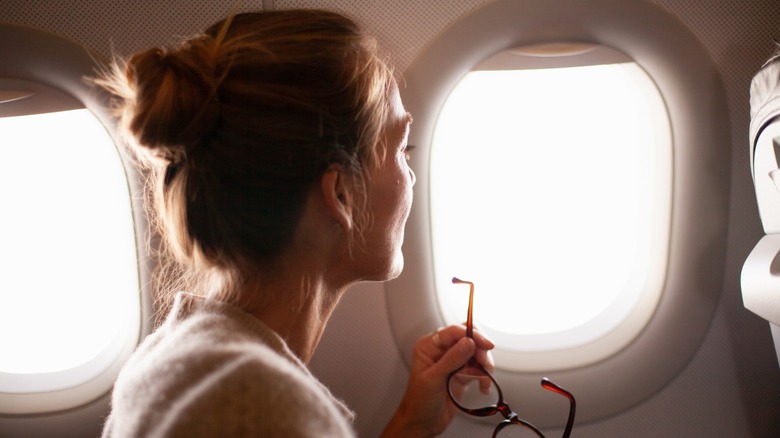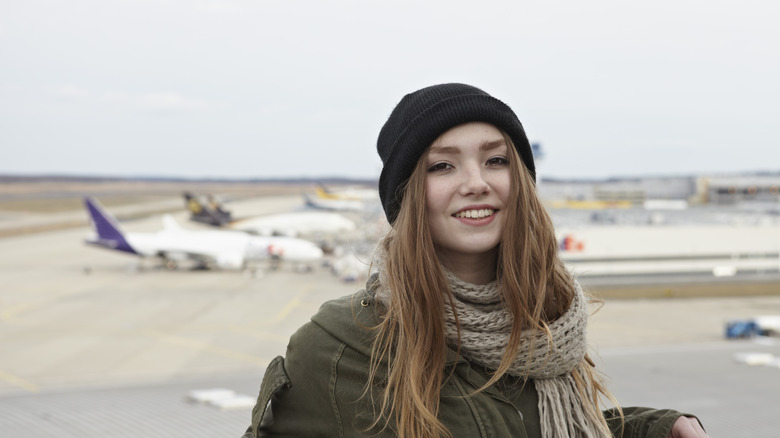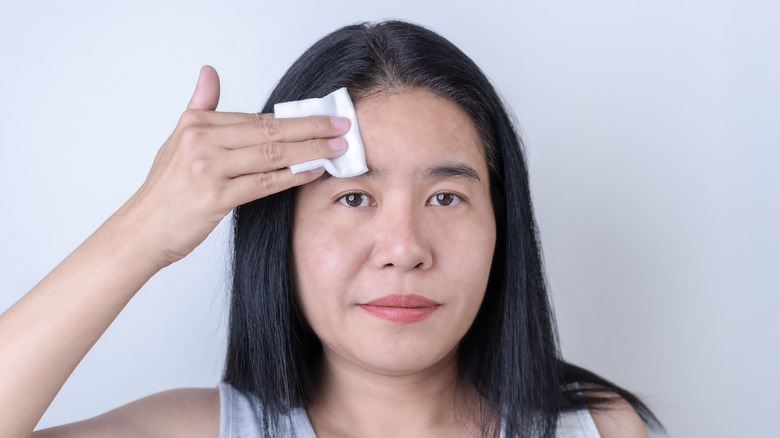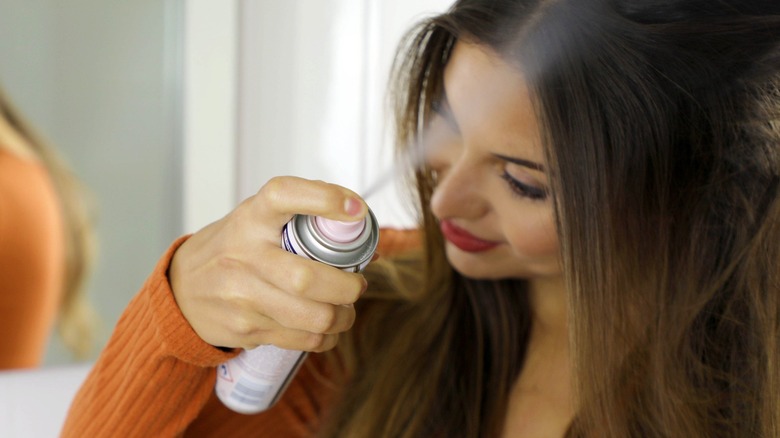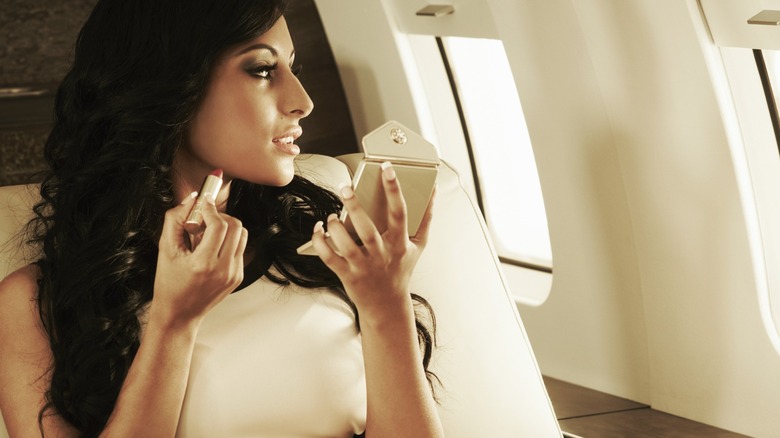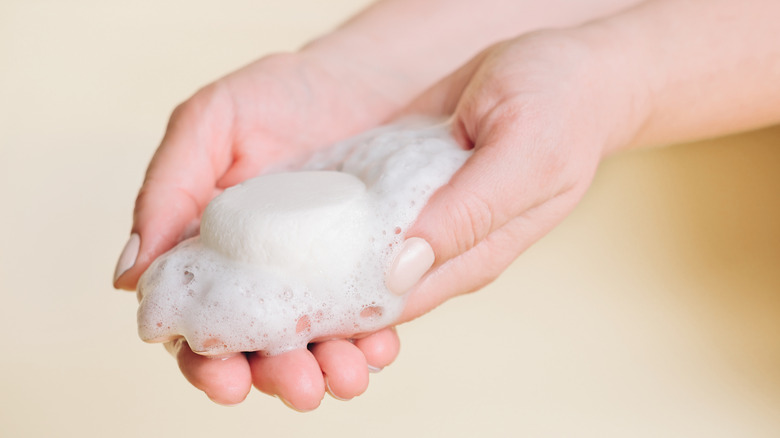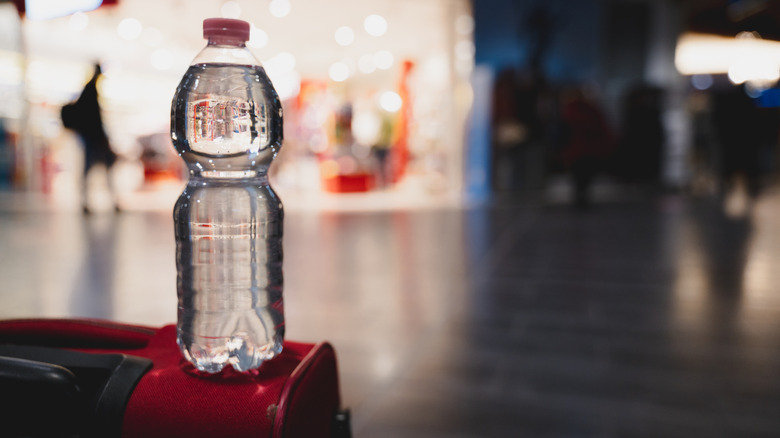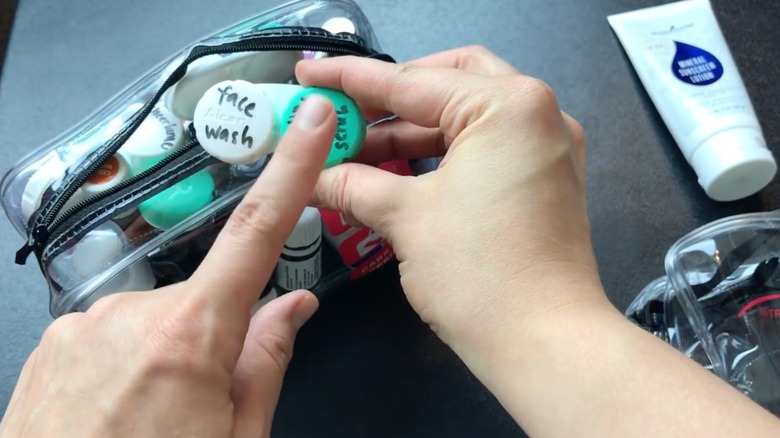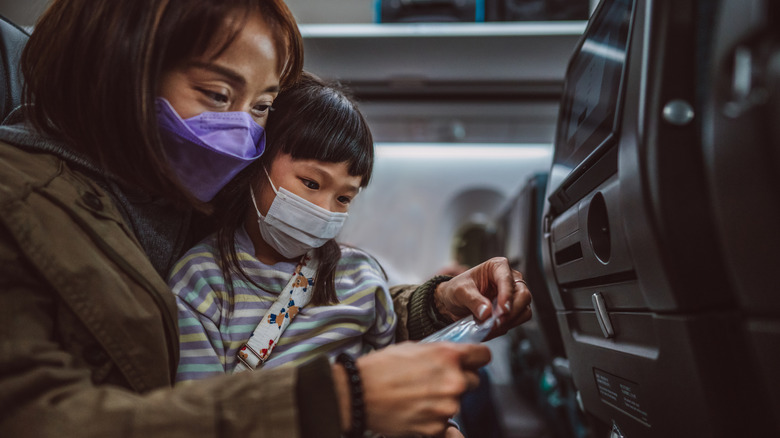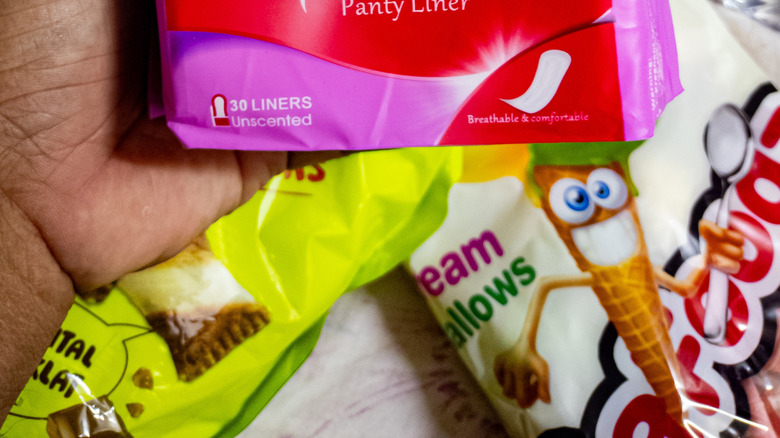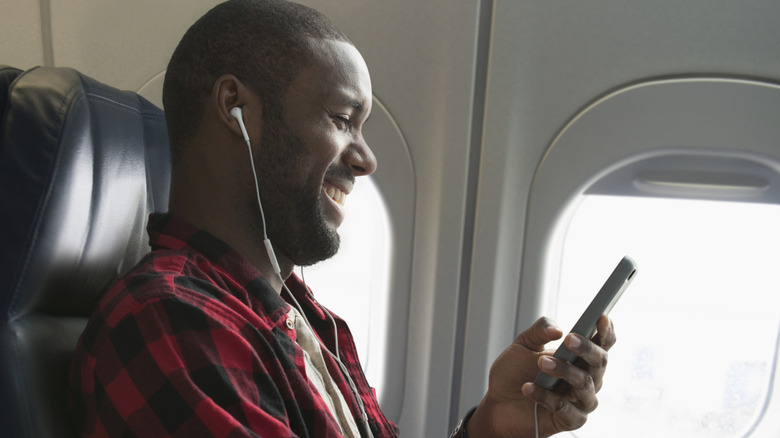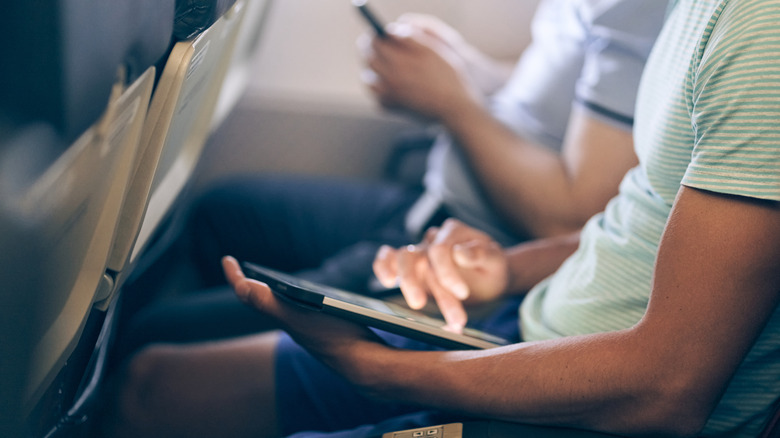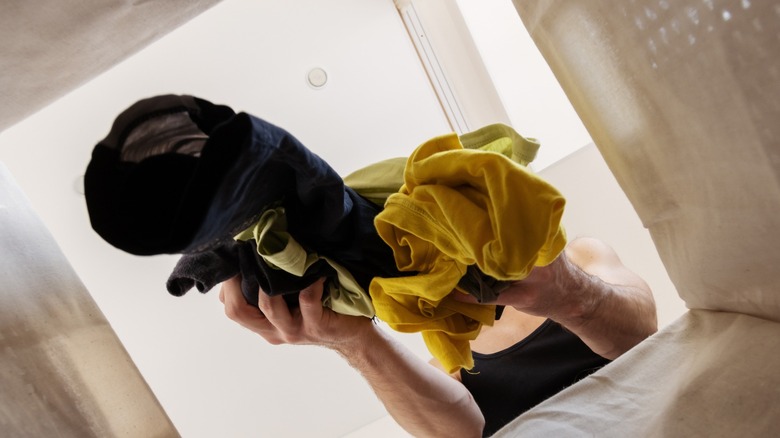Unexpected In-Flight Hygiene Tricks Frequent Fliers Swear By
It doesn't matter who you are, where you're coming from, or how fresh your vibes are. A long day of air travel and layovers can leave even the sharpest dressed passengers looking like something the cat dragged in. Whether you're heading out for work or play, there's a fair chance there's someone waiting for you on the other side of the terminal that you want to look nice for.
And even if you're just headed back home to crash, it's just nice to not feel like you crawled out of a trash bin or smell of eau d'aéroport — that heady blend of old coffee, airport food, and industrial cleaners with notes of jet fuel and diesel. As one frequent flier complained on Reddit, "I just started traveling often for work, and I noticed my clothes smell straight up like airport. Not that I stink, just like airplane smell."
Like everything from airport hacks to help you zip through TSA to tips for avoiding rookie flying mistakes, it pays to ask a seasoned airport traveler how they keep it together on a long flight. From fresh-faced makeup to sweat-free pits, it just takes a little ingenuity and some clever carry-on strategizing to elevate your post-flight hygiene from the ending of "Airplane" to "Casablanca."
Wear your hair up
If you feel that air travel leaves your hair grimier than usual, you're not alone. For some passengers, the dryer air in an airplane cabin can actually stimulate oil production. It might seem counterintuitive, but as the dry air inside of an airplane dries out our skin, our bodies can tend to overcorrect by producing more oil. By the time your plane pulls onto the landing strip, this can mean some unpleasantly slick roots for those among us prone to a little extra grease.
Pulling your hair back helps to minimize the oil on those roots. One of the main reasons is that it reduces the amount of grease that gets transferred from your hands to your hair throughout the day via touch, the idea being that you'll be less tempted to stroke your own hair. When hair is worn up, it's also much less obvious when your scalp becomes oilier throughout the day.
A simple french braid or pigtails will usually hold up pretty well through security checks and airport shuttles. Depending on your natural hair texture, a low bun can easily transform into effortless waves moments before landing. Just make sure it's not too tight since that can leave you with a headache. And avoid wearing a hat or walking around with your glasses on top of your head, as both can leave your scalp just a little bit oilier.
Wear a Merino wool beanie to reduce greasy hair
If you feel the cold or just enjoy the comfort of a good hat when you travel, one exception to the no hats rule is Merino wool, which can actually work to reduce your scalp's oil factor. Named after a breed of sheep that hailed from Spain during the Middle Ages, Merino wool is much finer than many other types of wool. Because it's less coarse, it's also much less itchy than less fine wool breeds — and more importantly, much more absorbent and moisture-wicking. You don't have to worry about the airport frizzies, and if you're in a hurry on your way to the airport, you can even slide your beanie over damp hair and end up with a surprisingly shiny, frizz-free look at the end of the day.
"Merino is amazing, semi-hollow, stays warmer than wool, can be worn in summer as the hollow fibers will also help to keep you cool in the sun and warm in the winter, doesn't hold scent easily, and is very soft," gushed one Merino hat wearer on Reddit. And when you're ready for that well-deserved mid-flight nap, it's simple enough to pull your hat down over your eyes and use it as a sleep mask.
Use individually-wrapped bamboo wipes for oil-free hair
TikTok user Madame Sweat offered a genius hack for dealing with the kind of greasy roots some folks tend to get when traveling. She recommends keeping a few individually wrapped wipes in your purse but specifies that they should be all-natural wipes, which makes sense since baby wipes have a very specific odor and are loaded with chemicals and synthetic fibers. "Using natural wipes, they'll smell beautiful like essential oils, which will also get rid of odor," she explained.
For her oily hair hack, Madame Sweat specifically recommended bamboo wipes, citing their high absorbency levels. When your roots start to get oily, grab a strand of greasy hair with a wipe and pull it across your hair from the scalp outward. "It freshens up your hair in a public washer," she emphasized, concluding, "I call it my shower in a sachet."
Bamboo wipes are also hypo-allergenic, which means they're much less likely to irritate your scalp. Even better, they're much less impactful on the environment than many other on-the-go hygiene products since bamboo grows and reproduces quickly. And perhaps most importantly, they're naturally anti-bacterial, which can help to reduce the smell of a sweaty scalp if that's an issue for you.
Or use dry shampoo
Dry shampoo isn't just for those days when you badly need a wash but don't have time for one or a stopgap when you're partying at a music festival. It's also one of the best ways to pull oil from a greasy scalp fast, and some regular air passengers swear by it as a simple travel solution that doesn't take up a ton of space in your luggage.
Since aerosol dry shampoos tend to take up a lot of space, one seasoned traveler recommended using a dry powder instead. "To make it extra packable, I'll even decant some of the powder into a plastic mini spice shaker (the kind cinnamon or nutmeg comes in)," they advised on Reddit. Others suggested there's no need to bother shelling out for high-end dry shampoo as cornstarch or baby powder is effectively the same thing. Folks with red hair can mix in a little cinnamon for color, while those with dark hair can darken theirs with cocoa so it blends in better. Just be careful to check the label and get unsweetened cocoa since sugar feeds bacteria and could easily compound your problems. Pack a foundation brush to apply it evenly across your scalp — something that can be tricky with powdered dry shampoos if you're not careful.
Change your in-flight makeup strategy
TikTok, Instagram, and YouTube are positively brimming with airplane makeup advice. One of the most common refrains is that just like the dry airplane cabin air can dry out your scalp and cause oily roots, it can have a similar effect on a passenger's facial skin — which is why makeup is not recommended for travelers who have issues with breakouts and oily skin problems. TikTok skin health influencer D the Korean explained, "You should never wear makeup on a plane," adding that the lack of moisture can cause oil overproduction that leaves your makeup with a dull and pasty appearance.
Recounting their experience with airplane makeup on Reddit, one airplane passenger explained their decision to ditch in-flight makeup after one especially dermatologically rough eight-hour flight with a full face of makeup. The experience led them to swear off makeup for long flights altogether, remarking, "I just felt so gross but it def depends on the person! My skin got super oily. I only wear makeup for shorter flights now."
If you just feel naked without makeup, prioritize skin health first. Spilling their in-flight makeup tips on Reddit, one flight attendant recommended using a good moisturizer followed by a moisturizing primer while at the same time steering clear of hyaluronic acid, which they advised could actually dry skin out more. Use a hydrating face mist while on the flight, and bring lip products, concealer, and powder for pre-landing touch-ups.
Bring solid toiletry products
Airplane water is sketchy enough that you should avoid using it for hygiene if possible — don't think about brushing your teeth in that bathroom. But if you can manage to sneak a bottle of water through airport security (or at the very least buy one from your flight attendant), a few high-quality solid toiletry products can go a long way in helping you freshen up before your flight lands. While liquid toiletries will invariably cause issues with airport security, solids won't be a problem. And you might be surprised at some of the products you can get in solid form, which frees you up to bring more of those moisturizers and lotions you'll so badly need after a long flight.
"I use a lot of solids so that I can focus on skincare in my TSA 3-1-1: solid shampoo; solid soap; solid conditioner; solid CeraVe; solid perfume; solid toothpaste," wrote one Reddit user. Lotion bars are another good option since they don't even require water — simply warm them up and you're good to go. The great news about solid toiletries is you can pretty much take anything you can fit in your carry-on, and they've been known to last a very long time.
Pregame your hydration game
One of the biggest pro moves for looking and feeling great on a flight is hydration from start to finish. That's because dehydration can leave you physically drained, which isn't a great look any way you slice it, and can even leave you suffering from muscle cramps or a monster headache. Healthy hydration helps your body to flush toxins out, improves your mood, helps freshen your breath, and can even help to reduce body odor.
There's really no point where it's too early to get started on your water game. That also means avoiding ingesting anything that could be dehydrating, like drinking the night before or going for an airport bar cocktail while waiting for your plane to arrive. And unless you're simply unbearable to be around when you don't get your coffee, you'll be more hydrated during your flight if you skip your morning cup of joe. We're sorry, we're so sorry.
Use contact lens cases to bring ultra-sample-sized toiletries
If you want to travel with just enough of a toiletry to help you refresh your hygiene just before landing, many seasoned air travelers say contact lens cases are the ultimate hack for circumventing TSA's restrictive liquids rules. That's because to keep contact lenses safe from bacteria and prevent liquids from seeping out at the same time, these little cases are typically watertight and yet small enough that they won't pose a problem with airport security. Each contact lens case fits about 2.5 ml of liquid — that's just enough for one or two uses of moisturizer or eye cream, depending on the product and how much you plan to use.
"I use contact lens cases for serum, moisturizer, foundation, highlighter, lube, everything," wrote one Reddit user. "You can pick contact lens cases up for as little as under a buck at your friendly neighborhood discount store. Get as many as you need, keeping in mind that you can fit two toiletries per case. Just don't forget to use a Sharpie to label each case so you won't forget what you packed, and you're good to go.
Freshen up with wet wipes
Wet wipes are the ultimate hygiene multitool, especially when it comes to air travel. You can use them to wipe down any surfaces you may have to touch — like your seat tray — and they come in clutch in the absence of any nearby water source if you just need to wipe away the grime from your face or hands. And they're fantastic if you have an unfortunate spill mid-flight. It also helps that they don't take up any of your precious little liquids allowance.
Extolling the virtues of these handy little travel aids, one Redditor wrote, "I upped my game and bring travel wipes instead of just hand sanitizer. I don't wipe my area down constantly, but they're handy to have for initial wipe downs or accidents." For pits and other bodily hot spots, a few seasoned travelers on Reddit specifically name-dropped wet wipes from Lume, the all-natural deodorant company. These wipes are acidified to avoid throwing off users' pH levels and are designed to help reduce body odor for up to a day.
Fresh undies are happy undies
Never underestimate the psychological value of a fresh-feeling pair of underwear when it comes to hygiene. With all of the hustling and/or bustling involved in the old airport shuffle, even the least sweaty travelers are bound to get a little perspiration going. And frankly, that can lead to some unfortunate side effects in the body's southern hemisphere.
In what is perhaps one of the most amusing subReddits on r/flying, professional pilots chimed in on the ubiquitousness of this common caboose ailment. Explaining the problem in Ted Talk-level precision, several Redditors noted that the wrong kinds of fabric can trap moisture, creating a seal for the sweat to hang out in. "As a moisture impermeable layer, that seat is going to trap 100% of the sweat your a** generates," wrote one Redditor. Another user on r/travel lamented, "Sitting still in a small for hours can make even the most hygienic of us feel sweaty and gross in that area."
Many concluded that the key to fresh-feeling undies is to invest in an underwear strategy that either breathes well or feels like it does. Some suggest bringing an extra pair altogether and changing once you're on the ground. A few women advocated using pantyliners as a barrier since they can be easily discarded. Most agreed breathable fabrics are a must for underwear and bras alike, with many men reporting that boxers are better than briefs for avoiding a sweaty caboose.
Avoid synthetic fabrics
There's no truer test of a fabric's sweat-worthiness than the triathlon that is air travel. Under the high-pressure conditions of a TSA stress test, shirts that seem fine under ordinary circumstances can start to pick up a little dampness in the pits. Throw on a couple of hours in a hot and crowded airplane cabin, and it's understandable why someone might be reluctant to reach up for their carry-on bag in the overhead bin at the end of a flight. Because if you can smell you, your neighbors most certainly can.
The first step to avoid smelling like a week-old burrito is to banish synthetics from your wardrobe altogether on air travel days. If you picked it up on an online discount site like Temu, chances are good it's highly synthetic. But even if you're wearing high-dollar rags, check the label because you'd be surprised at how common they are as more companies look for ways to cut corners and generate profit. Avoid nylon, polyester, and rayon when traveling since they all tend to hang on to unpleasant odors and trap body oils — sometimes indefinitely.
Invest in moisture-wicking fabrics instead
While you're adding synthetic fabrics to your list of things you should never wear on a plane, you should be looking for all-natural, moisture-wicking fabrics instead. Linen is the preferred choice of many a traveler. As one Reddit user put it, "Love linen because it's breathable and wicks moisture away, especially during the summer months." Another Reddit commenter who self-identified as the "sweatiest beast" wrote, "I personally don't think you can beat a linen t-shirt for breathability and quick drying times. Plus it's easy to dress up (to an extent) or down depending on how you style it." Linen is also fairly light and comfortable, making it a breezy fabric to wear on an airplane.
Cotton is also a pretty good fabric for air travel, although it's important to make sure you're not wearing a cotton-polyester blend, so don't forget to check your tags. If you're traveling during the winter months, Merino wool clothing (as mentioned previously) can also be a good investment — although it can take a long time to dry.
As a last resort, consider a sacrificial outfit
Ideally, most people should probably be striving to waste less rather than more these days with all of the controversies surrounding fast fashion, labor ethics, and the environment. But there's a very real contingent of airplane travelers who feel that sometimes, bringing a sacrificial airport along for the ride is the last best solution to airport hygiene, and it's tough to fault them for it. It makes a lot of sense.
And it doesn't have to be a perfectly good outfit. If you're not particularly vain, just pick something you probably shouldn't still be hanging onto anyway — something with a gnarly coffee stain that won't come out or a gaping hole under the left armpit. Be like the brave Redditor who told a forum full of strangers, "I wear a sacrificial cotton t-shirt on long haul flights. Then I just throw it out when I get there. It's sacrificial because it's got holes in it, or is stretched, or stained. I do the same for underwear."
Advising another Redditor who seemed to have a particularly frustrating airport stink problem, one user who advised making a throwaway outfit of old leggings and a sweatshirt emphasized that second-hand stores like Goodwill are also a viable source of sacrificial clothing that can reduce the impact on the environment.
